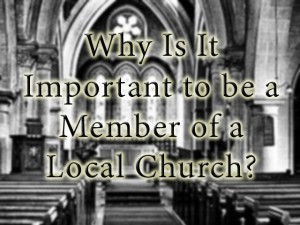Church is All About Me? Really?
I usually do not write about differences in doctrine amongst Christians (i.e. the current drama with Mars Hill and Mark Driscoll) – there are just too many other more important issues to focus on. Being a Christian is hard enough without the world seeing us fight amongst ourselves (it doesn’t help to reach those who have not met Christ yet).
The world really has little concern about our worship wars and dress codes. If we address an issue that we disagree over then it should be done privately with grace, empathy (as we are also sinners), and love. When we love a fellow believer then we should not “slam†them publicly. The truth is that most of those who do such things would never do it to their face, and it is much easier to critique someone “from their mom’s basement.â€[1]
Also, when the church stands together we are able to make significant changes in our culture, and when we are divided the world picks us apart. John 13:34-35 “A new commandment I give to you, that you love one another: just as I have loved you, you also are to love one another. 35 By this all people will know that you are my disciples, if you have love for one another.â€[2]
(Yeah, Â you knew it was coming) With that being said . . .
you know something’s up when Benny Hinn is attacking your doctrine.
so here’s the clip that is getting much attention right now amongst Christians. Victoria Osteen, the co-pastor of the largest church in America, said, “when we obey God, we’re not doing it for God, it’s for our self.” Now before you line up with your stones to throw, how many have said, “I don’t like the style of music,” or “can you believe what she is wearing at worship?” or “I don’t have time to serve right now, we’re too busy.” How many times have we echoed Osteen’s comment in our lives thinking but never saying, “church is about me and my feelings.”
This is not the first quote, or false idea to have surfaced from Lakewood Church in Houston, Texas that has caused doctrinal ripples. To say she was confused, said something she didn’t mean to say, or that the clip was taken out of context is simply not true. There are too many other quotes (and entire books) that say otherwise.
The reason I reference it is because I meet so many Christians that seem to be losing their way, especially in the area of doctrine. Â 1 Timothy 4:16 “Keep a close watch on yourself and on the teaching. Persist in this, for by so doing you will save both yourself and your hearers.”
_______________________
What’s the big deal? Isn’t this just a matter of opinion?Â
Culture keeps driving us to the truth of the gospel. Issues like baptism, church membership, alcohol, even the hotly debated music wars seem to have drifted into obscurity — many simply say “who cares?” Church attenders seem to not understand basic Christian tenants. Many essential doctrines have become, “well, that’s just your opinion.”
The danger of a weak doctrine among the church is that groups like Mormons and other truly false gospels are thought of as having the same beliefs as Christians. The church is so weak in it’s understanding that it becomes very vulnerable to believing the lies of the deceiver. Know this, that if you believe a false gospel you are not saved. Should we not do as 2 Timothy 2:15 says to, “Do your best to present yourself to God as one approved, a worker who has no need to be ashamed, rightly handling the word of truth.”
Let’s take Victoria Osteen’s comment that has gone viral. Why has it gone viral? Â Is it not because of how far it goes away from what the Bible clearly teaches? But she remains in her position of co-pastor. Then we have Mark Driscoll, the pastor of Mars Hill Church in Seattle, Washington who has solid doctrine but he is being asked to step down from his position for how he has treated others.[3]
But there we have it really in a nutshell. If you preach good feelings and happy thoughts but teach a false doctrine it is overlooked in Christendom. If you teach accurate doctrine but are a mean person, you will be asked to disappear. According to the current Christian culture it is more important for us to be nice than to be solid on our Bible.
Let’s look at that 1 Timothy passage again;Â “Keep a close watch on yourself and on the teaching. Persist in this, for by so doing you will save both yourself and your hearers.”
The ultimate issue is salvation “both [for] yourself and your hearers.” (those are pretty big stakes if we get this wrong). Â We must watch our own lives — we typically think of this in reference to sin. But could it also reference how our lives affect those around us (attitude, hospitality, generosity, compassion, etc.?) If you are a genuinely loving person then others will be open to what you have to tell them (i.e. Joel Osteen). But what you tell them must be doctrinally sound because there is only one gospel.
John 14:6 “Jesus said, ‘I am the way, and the truth, and the life. No one comes to the Father except through me.'”Â
Therefore, be nice, study your Bible, and buy a book on doctrine. It doesn’t sound fun but it is essential to understanding the things of God. It is much easier and fun to “claim” wealth, healing, and fame — the Bible and solid doctrine keeps you from seeking after the deceptions of this world. Solid doctrine keeps you focused on what is really important because you have as your foundation — truth.
________________________
[1] To reference Driscoll.
[2] Please no comments about how if we love one another then we should hold each other accountable with proper doctrine (I get that).
[3] articles relating to this topic tend to show that Driscoll is being asked to step down due to his rough treatment of staff and crude comments from the pulpit.



